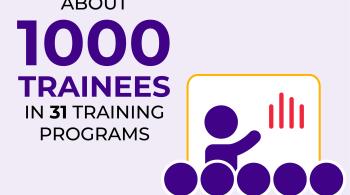BALTIMORE, August 31, 2022—Researchers have identified a group of previously overlooked “moderate effect” genes that are linked to autism. Their work is part of an ongoing effort that has revealed genetic influences among people all along the autism spectrum.
The research was conducted using data from Simons Powering Autism Research, or SPARK, the world’s largest autism study. Hundreds of patient families at Kennedy Krieger Institute have participated in SPARK, which has gathered DNA from more than 275,000 people across the country in an effort to better understand the full spectrum of autism genetics.
Researchers have long known that autism is inherited. However, previous studies only identified genes with de novo variants (DNV), or variants that occur spontaneously in germ cells prior to conception. They are not inherited. In addition to autism, most DNV are associated with neurological disorders, including seizures as well as lower cognitive function. Only 20 percent of people with autism have DNV.
By studying the DNA of nearly 43,000 people with autism, including 35,000 SPARK participants, researchers found a novel group of genes linked to moderate-effect autism and which have inherited variants. These genes also are not linked to cognitive differences or seizures. In short, this new discovery leads to greater knowledge of a condition that can have such wide-ranging characteristics.
The findings were published earlier this month in Nature Genetics.
“The word ‘spectrum’ is often used to describe autism, as there truly is a range of characteristics and symptoms among people with autism. This has made it difficult for researchers to previously pinpoint individualized markers of autism,” said Ericka Wodka, PhD, ABPP-CN, clinical director for Kennedy Krieger’s Center for Autism and Related Disorders. “Now we understand more of the genetic component, and this will lead to a greater understanding of this condition and more targeted therapies.”
Data from SPARK participants also indicated a 4-to-1 ratio of males to females with moderate-effect genetic variants. This differs from DNV, which has a ratio of 2-to-1 males to females. Scientists hope to learn if this is because females are more likely to have a genetic cause of autism, or if females with milder autism are less likely to be diagnosed with the condition.
As more families join SPARK, researchers will continue to identify and study the presence of moderate-effect genes. Currently SPARK coordinators are working to engage individuals traditionally underrepresented in research, including people of color. Engaging them in this work will further add to the knowledge of moderate-effect genes across racial and ethnic groups. Further research also will likely follow participants over time to understand how symptoms associated with the newly discovered genes change and influence outcomes.
“The results underscore the importance of participating in studies like this. We look forward to learning more and are so grateful to the families in Kennedy Krieger’s care who took the time to be part of SPARK to allow us to learn more about autism,” Dr. Wodka said.
SPARK is part of the Simons Foundation Autism Research Initiative. To date, more than 100,000 people with autism and 175,000 family members have participated in this U.S.-based study. More information SPARK can be found here.
About Kennedy Krieger Institute:
Kennedy Krieger Institute, an internationally known nonprofit organization located in the greater Baltimore-Washington, D.C., region, transforms the lives of more than 25,000 individuals a year through inpatient and outpatient medical, behavioral health and wellness therapies; home and community services; school-based programs; training and education for professionals; and advocacy. Kennedy Krieger provides a wide range of services for children, adolescents and adults with diseases, disorders and injuries that impact the nervous system, ranging from mild to severe. The Institute is home to a team of investigators who contribute to the understanding of how disorders develop, while at the same time pioneering new interventions and methods of early diagnosis, prevention and treatment. Visit KennedyKrieger.org for more information about Kennedy Krieger.
###















